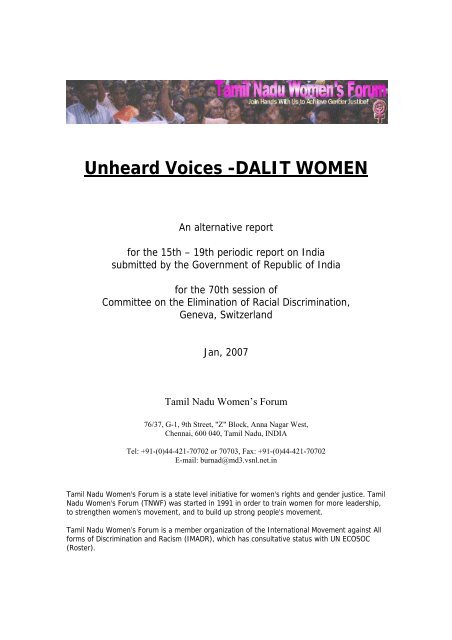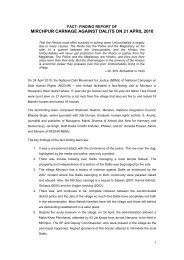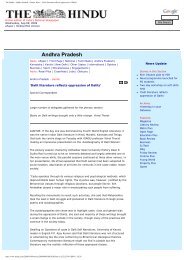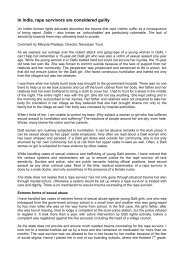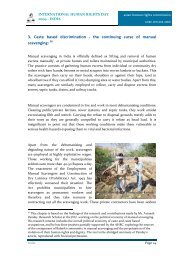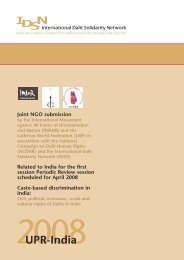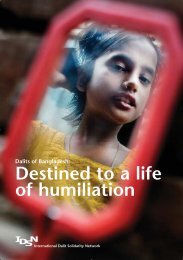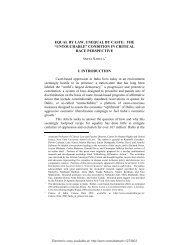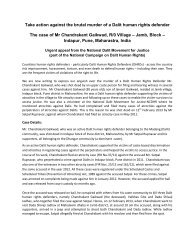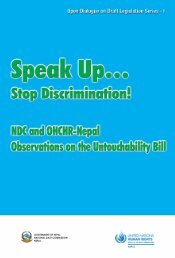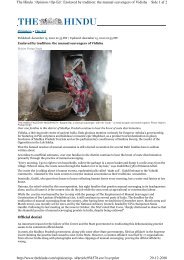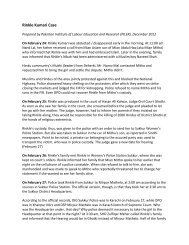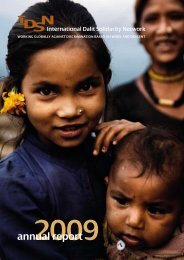Unheard Voices -DALIT WOMEN
Unheard Voices -DALIT WOMEN
Unheard Voices -DALIT WOMEN
Create successful ePaper yourself
Turn your PDF publications into a flip-book with our unique Google optimized e-Paper software.
<strong>Unheard</strong> <strong>Voices</strong> -<strong>DALIT</strong> <strong>WOMEN</strong><br />
An alternative report<br />
for the 15th – 19th periodic report on India<br />
submitted by the Government of Republic of India<br />
for the 70th session of<br />
Committee on the Elimination of Racial Discrimination,<br />
Geneva, Switzerland<br />
Jan, 2007<br />
Tamil Nadu Women’s Forum<br />
76/37, G-1, 9th Street, "Z" Block, Anna Nagar West,<br />
Chennai, 600 040, Tamil Nadu, INDIA<br />
Tel: +91-(0)44-421-70702 or 70703, Fax: +91-(0)44-421-70702<br />
E-mail: burnad@md3.vsnl.net.in<br />
Tamil Nadu Women's Forum is a state level initiative for women's rights and gender justice. Tamil<br />
Nadu Women's Forum (TNWF) was started in 1991 in order to train women for more leadership,<br />
to strengthen women's movement, and to build up strong people's movement.<br />
Tamil Nadu Women’s Forum is a member organization of the International Movement against All<br />
forms of Discrimination and Racism (IMADR), which has consultative status with UN ECOSOC<br />
(Roster).
Even as we are in the 21st millennium, caste discrimination, an age-old practice that<br />
dehumanizes and perpetuates a cruel form of discrimination continues to be practiced.<br />
India where the practice is rampant despite the existence of a legislation to stop this, 160<br />
million Dalits of which 49.96% are women continue to suffer discrimination. The<br />
discrimination that Dalit women are subjected to is similar to racial discrimination, where<br />
the former is discriminated and treated as untouchable due to descent, for being born into<br />
a particular community, while, the latter face discrimination due to colour. The caste<br />
system declares Dalit women as ‘impure’ and therefore untouchable and hence socially<br />
excluded. This is a complete negation and violation of women’s human rights. We urge<br />
this august body to pay special attention to this issue and come up with recommendations<br />
to eradicate the caste system.<br />
Dalit women are thrice discriminated, treated as untouchables and as outcastes, due to<br />
their caste, face gender discrimination being women and finally economic<br />
impoverishment due to unequal wage disparity, with low or underpaid labour. According<br />
to the Hindu caste hierarchy, there are four castes namely the Brahmins ( priestly caste),<br />
the Kshatriya ( warriors), the Vaishyas ( traders and the Shudras ( menial task workers).<br />
Below this four tier caste ladder is another rung, who are called the<br />
untouchables( Panchamas). Among the untouchables, the status of women is further<br />
eroded and closely linked to the concept of purity. This is what the rigid, fundamentalist<br />
Hindu promotes through continuation of caste system, imposing the Brahminical values<br />
to maintain the caste system’<br />
The creation of a number of Hindu religious books including the Manusmriti, Atharva<br />
Vedas, Vishnu smriti, and many others like these and their strict compliance by the<br />
Brahmans (upper priestly hindu caste), led to a society in which equality between men<br />
and women was far from existent (Agarwal). Dr. B.R. Ambedkar, an architect of the<br />
Indian constitution, also makes it very clear in his article titled “The rise and fall of<br />
Hindu woman” that the root cause of suffering for women in India are these so called<br />
Hindu religious books (Thind; Agarwal). Books like the Manusmriti divide people into a<br />
stratified caste system and promotes inequality between men and women (Thind;<br />
Agarwal). According to the Manusmriti, women have no right to education,<br />
independence, or wealth (n.pag). It not only justifies the treatment of dalit women as a<br />
sex object and promotes child marriage, but also justifies a number of violent atrocities<br />
on women as can be seen in the following verses (Agarwal; Manusmitri):<br />
A man, aged thirty years, shall marry a maiden of twelve who pleases him. Or a man of twenty-four a<br />
girl of eight years of age. If (the performance of) his duties would otherwise be impeded, he must<br />
marry sooner. (Manusmitri IX.94)<br />
By a girl, by a young woman, or even by an aged one, nothing must be done independently, even in<br />
her own house.” (Manusmriti V.147)<br />
Her father protects (her) in childhood, her husband protects (her) in youth, and her sons protect (her)<br />
in old age; a woman is never fit for independence. (Manusmriti IX.3)<br />
1
Women have no right to study the Vedas. That is why their Sanskaras are performed without Veda<br />
Mantras. Women have no knowledge of religion because they have no right to know the Vedas. The<br />
uttering of the Veda Mantras is useful for removing sin. As women cannot utter the Veda Mantras,<br />
they are as unclean as the untruth. (Manusmriti IX.18)<br />
A Brahman, Kshatriya, or Vaishya Man can sexually exploit any shudra woman. (Manusmitri IX.25)<br />
Even the killing of a dalit woman is explicitly justified as a minor offence for the<br />
Brahmins: equal to the killing of an animal (Manusmitri). If the killing of an untouchable<br />
was justified as a minor offence, you can imagine the treatment they received throughout<br />
their lives.<br />
In a male dominated society, Dalit women suffered unimaginable oppression, not only<br />
through caste, but gender too, from which there was no escape. The laws in the<br />
Manusmriti and other Vedic scriptures close all economic, political, social, educational,<br />
and personal channels through which Dalit women could be uplifted (Thind n.pag). The<br />
horrendous Laws in the Manusmriti were incorporated into Hinduism because they were<br />
favourable only to the Upper castes, which form the majority of India. Even today, in<br />
modern times, we see the severe oppression and exploitation of Dalit women. The Laws<br />
of the Manusmriti have a devastating effect on the level of education reached by Dalit<br />
women.<br />
The caste discrimination inherited by birth results in Dalit women facing multiple<br />
oppression that violates their economic, political, social and cultural rights. The most<br />
deprived section of the society comprises of dalit women who are the poorest, illiterate<br />
and easy targets for sexual harassment. The women face not just caste violence inflicted<br />
on them by the dominant castes, but also state violence.<br />
ECONOMIC<br />
Of the total population, Dalit women constitute 16.3% of which 18% women live in rural<br />
areas. The women perform hard domestic labour which is unpaid and as agricultural<br />
labourers or casual labourers they continue to toil under the burning sun, with no<br />
protection or benefits that labour laws should provide, since majority of these women are<br />
in the unorganized sector. They do not even get the minimum wages that the<br />
state/country has specified, since they are unable to organize and demand for decent wage.<br />
Dalit women undertake manual, low paying, tedious, time consuming work. They earn<br />
less than one U.S. Dollar.<br />
The women have to walk miles to fetch drinking water and often the water is not safe and<br />
potable. Dalit hamlets are usually at the end of the main village or in the village outskirts.<br />
They live in small huts and even the few who may have slightly better housing are devoid<br />
of basic amenities such as sanitation, light and safe and clean drinking water. The women<br />
work on construction sites, carrying heavy loads of construction material. They also work<br />
in brick kilns for long hours, as casual labourers to lay roads with hot tar in the burning<br />
sun, without sandals and any other protective gear. The women have to walk miles not<br />
2
just for collecting water but also fuel and fodder for their domestic chores. Dalit women<br />
are victims of bonded labour, they are abused, sexually exploited by other caste,<br />
humiliated and are easy targets of insult.<br />
A study conducted come up with some shocking facts about the work of dalit women.<br />
What is horrifying is that Dalit women work more than bullocks and men. Bullocks and<br />
men work in a hectare in a year for 1064 hours and 1202, respectively, while women<br />
work for more than 3485 hours. The caste and patriarchal norms legitimise the poor<br />
economic conditions of Dalit women. She has to work to survive. She is powerless and<br />
has neither access nor control over resources.<br />
Manual scavenging continues as an occupation in India and most of the manual<br />
scavengers are Dalit women. The women are subjected to do this humiliating and<br />
degrading work, which further results in discrimination and social exclusion.<br />
GLOBALISATION<br />
The process of globalisation has affected Dalit women considerably. With the<br />
introduction of new farming techniques such as, mechanization for harvesting and<br />
transplanting, women have lost their traditional work in the agricultural sector. Food<br />
crops have been replaced by Cash crops. Horticulture has been introduced by, big agrobusiness<br />
corporations for export purposes. This has deprived Dalit women of their land<br />
and the common resources in the village. Formerly women used to collect greens, fish,<br />
and shells from fields free for their food requirements. This is no longer available to them.<br />
The abject poverty condition has driven large numbers of Dalit women into sex trade to<br />
earn for their families. The Globalisation process has increased the feminisation of<br />
poverty and this has affected Dalit women in every sphere of their lives. There is also<br />
large scale migration from rural areas to the urban centres in search of better livelihood<br />
options. Women are left behind to bear the responsibility of the family. This further adds<br />
to the existing burden that Dalit women are trying to cope with. More and more female<br />
headed households emerge and most of them are Dalit women. Such situations push the<br />
women into further situations of impoverishment, making them more and more<br />
vulnerable to all forms of discriminations and violations.<br />
HEALTH<br />
The health condition of Dalit women is alarming with high incidence of maternal<br />
mortality and infant mortality. This is due to the fact that Dalit women are unable to<br />
access health care services. Due to denial and sub standard healthcare services the life<br />
expectancy of Dalit women is as low as 50 years. The infant mortality rate is 90 / 1.000.<br />
The sex ratio of Dalit women is 922 / 1000 compared to 927 / 1000 for rest of the<br />
population in India. Due to poverty, Dalit women are malnourished and anemic. Early<br />
marriage and multiple child births causes the women to suffer from prolapsed uterus.<br />
Continuous bending and working while sowing and harvesting in agricultural causes<br />
acute back pain. They also develop skin irritation and allergy due to excessive use of<br />
pesticides. As they work barefoot and the soil is damp and wet, the women develop soars<br />
3
etween their toes. Due to lack of awareness and medical care, many of them suffer from<br />
reproductive health complications, including STDs and cervical cancer with white<br />
discharges.<br />
Dalit women are easy target for the Government Birth Control Schemes. Women face<br />
forced sterilization, are tested for the use of new invasive hormonal contraception like<br />
guinea pigs. They are forced to use long-acting, hormonally dangerous contraceptives.<br />
They do not get basic medical facilities. Pregnant Dalit women receive discriminatory<br />
treatment in hospitals and there are instances where doctors have refused to conduct the<br />
delivery of Dalit women.<br />
Sasi, a Dalit woman, committed suicide by burning herself because she was deserted by her man. The<br />
doctors at the government hospital refused to treat her because she was a Dalit and she died due to lack of<br />
treatment.<br />
EDUCATION<br />
A large majority of the illiterate population comprise of Dalit women with 76.24% of<br />
Dalit women being illiterate. The girl drop out rate among Dalit families is increasing<br />
with girl-children are forced to work as child laborers, More and more girl children from<br />
Dalit communities are school drop-outs and working as child labourers. Dalit women are<br />
illiterate because they have less access to education which is an inherent part of the caste<br />
system. There are not enough secure facilities for education, taking care of small children<br />
and they join the adults to add to the income of the family. Dalit girl children are<br />
involved mostly in hazardous work like Beedi making, working in match factories and in<br />
the fire-works industry.<br />
Traditionally dowry, which is not a practice of the Dalits has now became a bane. Due to<br />
Sanskritisation by the caste Hindus, the Dalits have begun to emulate the customs and<br />
rituals of the hindus. Dowry is one such custom. The Dalit families have succumbed to<br />
the societal pressures, added to this the fear of sending the girls to schools which are<br />
usually located in distant places deprive them of education.<br />
Nirma Rani, a Dalit girl student was slapped for saying "Namaste" to a Brahmin teacher and her father was<br />
beaten up later for questioning such an act. Caste is practised in schools where Dalit children occupy<br />
separate seats given to them. Dhanam lost her eye when she was beaten up by her teacher for taking<br />
drinking water by herself without waiting for the other caste fellow to serve her from the pot.<br />
Girl children are deprived of access to education as belonging to economically weak<br />
families, they are unable to pursue their education. They do not get uniforms, school<br />
books, special fees, and have to walk long distances to reach their school. This is a<br />
limiting factor for dalit children.<br />
4
POLITICAL POWER<br />
Dalit women are excluded from decision making. They are not in a position to exercise<br />
their power. Wherever dalit women have contested, they have faced stiff opposition and<br />
even been brutally attacked. The 73rd amendment provides for mandatory reservation for<br />
Dalit women to be elected to the local governing bodies. They are elected but not able to<br />
exercise their power. Menaka (a Dalit women and a village Panchayat President was<br />
killed in broad day light.<br />
Ranganayaki was deposed for solemnising an inter-caste marriage. Banwari was gang<br />
raped when she objected and reported to the authorities against child marriage in her<br />
village. Gowri was made to parade naked for hoisting a flag on Independence Day. Dalit<br />
women are militant and powerful. They are now fighting for political power within this<br />
caste system.<br />
There are instances where Dalit women have been elected into local governance and<br />
through the reservation policy nominated as the President of the local governing unit<br />
called Panchayat. But when these women have endeavoured to exercise their role, it has<br />
met with resistance even to the extend of physical violence. A Dalit woman President is<br />
not allowed to sit on a chair if the other caste members do not allow this. She is forced to<br />
be a mere figure head, while the functioning of the Panchayat is taken over by other<br />
upper caste members.<br />
There are several traditional practices and customs that violate human rights. The practice<br />
of dedicating girl-children to become Devadasis, Basavis and Mathammas. This practice<br />
is a violation of Dalit Women's Rights. Dalit women are discriminated and treated as<br />
untouchables. The shoemakers, Arunthathiar, practice Mathamma, dedicating Dalit girl<br />
children to their goddess Mathamma.<br />
Superstition coupled with poverty and illiteracy is responsible for such practices. It is also<br />
using religion to sanction prostitution through the interpretation of mythology by the<br />
upper caste so that they can both economically and sexually exploit dalit women. It also<br />
is a form of upper caste manipulation to control the lives of Dalits. Further the lack of<br />
medical services, allows for such practices to flourish. There is a strong belief that the<br />
goddess has healing powers. So when a Dalit girl is sick. She is taken to the temple and<br />
left there till she is cured of her sickness. As already mentioned the economic situation is<br />
another reason that Dalits are unable to spend money to buy good health service. Once<br />
the child is cured, the child is named after Mathamma and married to the goddess with<br />
the "Pottu Thali" (wedlock). After she becomes a dancer she belongs to the temple.<br />
During temple festivals she dances and earns her livelihood. She is not treated with<br />
respect and publicly humiliated by men who harass her sexually.<br />
The team which plays music with her exploits her by having a share in what she earns.<br />
Once the girl is dedicated to Mathamma, she cannot marry and lead a family life, as she<br />
is wedded to the Goddess. Therefore, she is sexually exploited by her partner who leaves<br />
5
her, to fend for herself and her child. Other men also tend to sexually exploit these Dalit<br />
women. Mathammas have no family, no security and left all alone with a child, so she<br />
has to struggle life long to maintain herself and the child.<br />
Dalit women who are dedicated to Mathammas end up in the sex trade and become<br />
vulnerable to sexually transmitted diseases including HIV/AIDS.<br />
Dalits facing Human Rights violations is a legion. A random sampling of headlines in<br />
mainstream Indian newspapers tells their story: "Dalit boy beaten to death for plucking<br />
flowers"; "Dalit tortured by cops for three days"; "Dalit 'witch' paraded naked in Bihar";<br />
"Dalit killed in lock-up at Kurnool"; "7 Dalits burnt alive in caste clash"; "5 Dalits<br />
lynched in Haryana"; "Dalit woman gang-raped, paraded naked"; "Police egged on mob<br />
to lynch Dalits".<br />
"Dalits are not allowed to drink from the common wells meant for all the people, attend the same temples,<br />
wear shoes in the presence of an upper caste, or drink from the same cup in tea stalls," said Smita Narula, a<br />
senior researcher with Human Rights Watch, and author of Broken People: Caste Violence Against India's<br />
"Untouchables." Human Rights Watch is a worldwide activist organization based in New York.<br />
India's Untouchables are relegated to the lowest jobs, and live in constant fear of being<br />
publicly humiliated, paraded naked, beaten, and raped with impunity by upper-caste<br />
Hindus seeking to keep them in their place. Merely walking through an upper-caste<br />
neighborhood is a life-threatening offense.<br />
Nearly 90 percent of all the poor Indians and 95 percent of all the illiterate Indians are Dalits, according to<br />
figures presented at the International Dalit Conference that took place May 16 to 18 in Vancouver, Canada.<br />
Non-implementation of existing safeguards<br />
Despite the existence of constitutional, administrative and legal provisions to protect<br />
women from all communities, and specific provisions for women in the Scheduled Caste<br />
and Scheduled Tribes (Prevention of Atrocities) Act (1989), women of disadvantaged<br />
groups are vulnerable to gender-specific abuses such as rape, stripping and being paraded<br />
naked. AI found non-implementation of the provisions set up to protect these very<br />
women against such abuses and to enable them to take advantage of the criminal justice<br />
system. Impunity for perpetrators remains one of the main obstacles to stopping<br />
violence/torture of women both in the community and by employees of the state. This<br />
pattern of non-implementation leads AI to believe that the government of India is failing<br />
to exercise due diligence in preventing these abuses.( Amnesty International Report)<br />
The Appeal<br />
Caste, class and gender discrimination prevents Dalit women from enjoying their basic<br />
human rights, particularly to dignity, equality and development. Atrocities and violence<br />
6
against Dalit women are both a means of sustaining systemic discrimination, as well as a<br />
reaction when particularly untouchability practices and caste norms are challenged or not<br />
adhered to. Impunity for this discrimination and violence is then used as a means to<br />
preserve the existing caste and gender disparities. Before Dalit women can enjoy their<br />
human rights, and before the Millennium Development Goals can be achieved,<br />
discrimination, violence and impunity must stop.<br />
Cases of Atrocities committed on Dalit Women<br />
Asha a seven year old Dalit child who belongs to the Meliruppu village of Cuddalore district was brutally<br />
raped by an other caste boy Kuppan from the same village on 23.05.2005. The child fell unconscious and<br />
had to be rescued by a team of Dalits who later admitted the child in a hospital. A case was registered after<br />
much protest from the villagers. However the police failed to register the case under the SC/ST prevention<br />
of Atrocities Act. The perpetrator was arrested and enlarged on bail.<br />
(Global Action for Dalits: Report 2005, Tamil Nadu Women’s Forum)<br />
Rajasthan Dalit social worker gangraped –January 24th ,2006<br />
In a chilling reminder of the Bhanwari Devi case, a Rajasthan anganwadi worker was allegedly<br />
gangraped by her supervisors during a state sponsored training session. Instead of helping the 25 year old<br />
Dalit woman, the police tried to hush up the incident, declaring her mentally unstable and packing her off<br />
to a psychiatric clinic. According to the FIR the woman, an anganwadi sahyogini, was raped by three of<br />
her supervisors after her female supervisor took her to a room at the training center in Karauli, some 150<br />
km from Jaipur. The incident took place on the night of December 30th,2005. Her husband was told three<br />
days later that she had been admitted to a hospital after a ‘mental breakdown’. We brought her back to<br />
Karauli but the police refused to file our case. When they finally lodged an FIR on January 20, the SP<br />
again sent her with a constable to Jaipur to get her admitted to the SMS Hospital’s psychiatric center. Her<br />
husband Ram Niwas Meena said that SP B K Pande denied the charge: ‘We did not send her to the<br />
psychiatric center. We have arrested two accused and are hunting for the other two’. Home Minister<br />
Gulab Chand Kataria, who visited her in hospital today, said a probe will be held.<br />
Dalit women tortured in Jail – Punjab<br />
Three Dalit women from Muktsar district in Punjab have accused the police of torturing them, including<br />
administering electric shock to their “private parts” and confining them illegally. Talking to reporters at the<br />
BJP headquarters in Chandigarh on Friday, Amarjit Karur, Virpal Kaur and Rarni alleged they were picked<br />
up by the police after they rejected the overtures of two drug traffickers to join the flesh trade. Amarjit<br />
alleged she and Virpal were detained for five days at the police station. “We were tortured in the presence<br />
of the SHO. We were stripped and electric shock administered to our private parts,” she said, adding that<br />
she suffered a miscarriage due to this. Virpal said their families were silenced with threats. Both claimed<br />
they were let off without registration of any complaint or FIR after five days. They alleged the SHO was<br />
acting at the behest of the drug traffickers. Rani’s claims were similar. The district BJP unit arent’t buying<br />
the DSP’s claim that the women were picket up for trafficking poppy husk and plan to approach the Punjab<br />
Human Rights Commission, National Women’s Commission and SC/ST Commission.<br />
(Hindustan Times 18.2.06)<br />
7
Dalit women denied passport<br />
Girija Devi, a Dalit woman who was scheduled to attend a UN seminar in the US, failed to get her<br />
passport. Opposition parties in the state have threatened to take up the issue in the assembly, Girija Devi, a<br />
59 year old mother of four from the Musahar community, was scheduled to address a seminar on ‘Women<br />
Environment and Development Organisation’ in Bhojpuri. “It was the state government’s fault. This was<br />
done to stop her from attending the UN convention to present her views” said RJD leader Shayam Rajak.<br />
Musahar Vikas Manch leader Amar Kumar Majhi said red-tapism was to blame. “The old Dalit woman<br />
was forced to run from one office to another. She would had done Bihar proud by speaking at an<br />
international convention” he said. Chief Minister Nitish Kumar said, “I will take action. Let me collect the<br />
facts”.<br />
(Hindustan Times 28.2.06)<br />
Death in police station, probe sought<br />
Jaipur: The National Campaign for Dalit Human Rights has demanded a CBI enquiry into the death of a<br />
Dalit woman in Chomu police station of Jaipur district on Thursday. The woman, Kamla, who was brought<br />
to the police station to meet her son who was in police custody on a charge of murder, had died of mental<br />
shock and agony due to police misbehaviour, an enquiry report by NCDHR and Centre for Dalit Rights<br />
said. The main opposition in the State, the Congress party had made a similar demand. Pradesh Congress<br />
Committee president B.D. Kalla in a statement on Friday demanded a judicial enquiry into the case. The<br />
party has alleged that the death had taken place at the police station following the ill treatment of the victim.<br />
The Chomu police last week had arrested Kammla’s son Sumit on a charge of murdering a history sheeter<br />
Sikandar Khan. Kamla, a schoolteacher was taken to the police station on Thursday last by five constables,<br />
including two women constables to meet her son in the lock up. The police version is that the woman,<br />
apparently depressed over the act of her son had consumed poison at home before leaving for the police<br />
station. She gave a dying declaration to this effect but her family members had challenge this. The<br />
NCDHR team, which visited the spot, found the role of the police and administration “doubtful”.<br />
(The Hindu 5.6.06)<br />
Upper castes ill-treated us Dalits<br />
Dalits in Cidiyas village, in Rajasthan’s Bhilwara district, say they were ill treated when they<br />
worked as labourers engaged in famine relief. “The upper caste Hindus treated us as untouchables when<br />
they served drinking water,” said Prema Meghwal. The village falls under the constituency of Rajasthan<br />
rural development minister Kalular Gujar and has a small Dalit population. The upper caste Hindus<br />
employed three upper caste women – Madhu, Chandi and Pushpa Suthar- to serve water to the Dalits at the<br />
relief work site Badri Meghwal told this correspondent. Last week, they decided to clean up the temple to<br />
Devra, a local deity, and asked the relief workers to volunteer. “They employed Dalit women to clean the<br />
premises. When the work was finished, they collected Rs.5 from each worker, barring Dalits, saying their<br />
contribution would not be accepted by the deity,” claimed Bhanwar Meghwanshi, a Dalit activist in Cidiyas.<br />
“It is shocking for us as the deity accepted our voluntary work, but not offerings,” said Mr. Meghwanshi,<br />
well known among Rajasthan’s Dalits as he publishes a magazine title Diamond India from his village<br />
Cidiyas. His wife Prema, who feeds her family by working as a relief worker, said there were 50 people<br />
employed at a government relief work of which 13 were Dalits. “You can see 23 workers are from a single<br />
powerful caste. Their males will not work, but they get a share in the earnings because the payment is taskbased,”<br />
Said Prema, adding, “We were not allowed to touch the pitcher and water served by upper caste<br />
women when we requested them,” She said. The Dalits raised the issue in the village, but the upper caste<br />
Hindus said it was a tradition and no one had the right to oppose it “I have asked the sub-divisional officer<br />
to look into the matter and send a report,” said Bhilwara additional district magistrate M.L. Yadav Reeling<br />
under severe drought conditions, Cidiyas has 300 Dalits and is dominated by caste Hindus. “Many times<br />
8
we quench our thirst with polluted water served by caste Hindus, “said Mr. Meghwanshi. “It is painful for<br />
as it happens during government-run relief work,” he added. (Asian Age 21/6/06)<br />
Doctor robs Dalit woman of Kidney<br />
In a bizarre incident, a Dalit woman has been robbed of her kidney by an Uttaranchal-based doctor. The<br />
woman has been waging a lone battle to get a case registered against the doctor but the police has, so far,<br />
refused to lodge her complaint. The victim has now written to the President of India and the National<br />
Human Rights Commission for justice and is also preparing to go to court. According to Phool Singh, a<br />
resident of Akbarpur Patti village in Jyotiba Phule Nagar, his wife Maya, 45, had been diagnosed as having<br />
stones in the uterus in December 2003. “We are poor and could not afford to bear the expenses of the<br />
operation. A relative told us about one Dr. Arun Richharia at Rudrapur in Uttaranchal, who does not charge<br />
fees from poor people. I took my wife to Dr. Richharia’s clinic, and she was operated upon by the doctor on<br />
December 20, 2003. We returned home after the operation, but after some time my wife again complained<br />
of pain. I took her back to the doctor for a checkup but he said that it was a minor post-operative problem<br />
that would vanish after a few months,” says Phool Singh. The couple returned to their village, but Maya<br />
continued to suffer from intermittent pangs of pain for almost two years after the operation. Finally, in<br />
January this year, the couple went to consult another doctor in the district, who recommended an ultrasound<br />
test. “When we got the ultrasound test done, we were shocked to find that Maya’s left kidney was missing.<br />
The following day we went to Dr. Richharia’s clinic and informed the receptionist of our problem. To our<br />
dismay, the doctor refused to meet us, and the hospital staff physically assaulted us for ‘attempting to<br />
malign the reputation of the doctor’,” says Phool Singh. The couple went to the local police station, but the<br />
police refused to register their complaint. “The police was obviously under the influence of the doctor, and<br />
though we showed them all the relevant papers related to the operation, they just refused to entertain our<br />
complaint,” says Phool Singh. (Asian Age 21/6/06)<br />
Dalit Woman beaten up and paraded naked<br />
A 50-year-old Dalit woman in a Jharkhand village was beaten up and paraded naked for allegedly “selling”<br />
a 12 year old boy in Uttar Pradesh two years ago. Balchand has been traceless ever since Sukri took him to<br />
UP with the assurance of a job. After the family of Balchand Oraon failed to trace the boy, they approached<br />
Sukri, a resident of Saram village. When Balchand’s father Mangra Oraon inquired about his son, Sukri<br />
said he had run away at Mugalsarai station and she had no clue about his whereabouts. Some people who<br />
had accompanied Mangra Oraon started beating up Sukri. Her husband Indru Nayak was also beaten up<br />
when he tried to intervene. Sukri was then forcefully taken to Balchand’s village and stripped. She was<br />
forced to roam around the village and was later tied to a tree. The villagers then started beating her with<br />
sticks. The boy’s family believes Sukri sold Balchand and that he was still in the captivity of the owner of a<br />
brick kiln. After seven hours of trauma, the village elders decided that the Dalit woman should be burnt<br />
alive so that no other person would dare to so such a thing. Just when kerosene was being poured on her,<br />
some local journalists and the Chanho police reached and rescued her. Mangra has been arrested. (Asian<br />
Age 24/6/06)<br />
SC body backs woman sarpanch<br />
The National Commission of Scheduled Castes has asked the Superintendent of Police of Jhajjar district<br />
(Haryana) to furnish the details in the alleged implication of a “Dalit woman sarpanch”, Sheela Devi, in a<br />
murder case. Her family members have approached the National Commission for Scheduled Castes which<br />
had earlier sent notice to the SP of Jhajjar that if the reply was not filed within the stipulated time, the<br />
commission may exercise the powers of civil courts conferred on it by the Constitution. On February 24,<br />
2006. Youth Congress leader Bachu Pehlwan was shot dead in broad daylight by three men, near local<br />
MLA’s office in Bahadurgarh. Immediately, the police arrested nine people for his murder including a<br />
9
Dalit woman sarpanch of Mandothi. Sheela Devi had won the village Panchayat election in 2000 from a<br />
reserved seat. Currently Sheela is under police arrest. But her family members are crying foul. According to<br />
them the village is notorious for group politics that has resulted in several gang wars. They allege that<br />
murder of Bachu Pehlwan is the result of a gang war. To vindicate their stand they sighted the 26 murders<br />
that have taken place in the village after the gang war was ensued between the two groups of Jats in 1994.<br />
The family members of Sheela Devi also allege that the village Panchayat was about to receive Rs. 4 crores<br />
as land compensation and one group was eyeing this amount. The group with the support of local MLA<br />
Rajendar Joon has falsely implicated Sheela and her husband. MLA Rajendra Joon was quick to refute the<br />
charges. He said, “The matter has not occurred because of the money, instead it is because of the rivalry<br />
that Bachu was murdered.” “In the war of the two groups, the Dalits are suffering as the poor people have<br />
to do what the groups of the goon are saying. They used to ask the sarpanch to use scandalous methods to<br />
siphon off the allocated money,” he said. Mr. Joon further countered the charges by saying, “It was me who<br />
used to stop them and this has made me an eyesore for them.” (Asian Age 28/6/06)<br />
Dalit women in UP protection force<br />
In a move that will lead to empowerment of Dalit women in Uttar Pradesh, the Mulayam Singh government<br />
has decided to enroll Dalit women in the Prantia Rakshak Dal. The Prantiya Rakshak Dal (PRD) is a statelevel<br />
protection force that is usually deployed to maintain law and other in villages, in large congregations<br />
like the Kumbh Mela and during elections. The strength of the PRD force in UP is 24,000 and PRD jawans<br />
are sent for refresher training every three years. This will be the first time that women will get a chance to<br />
be a part of the PRD which, till now, is an all male force. The state government has now cleared the way<br />
for enrolment of more than 500 Dalit women in the PRD and recruitment will begin shortly from the<br />
district to the block level. Talking to this newspaper on Saturday, a senior official of the PRD department<br />
said,”This is being done for the first time to empower Dalit women in the age group of 20 to 30. Under the<br />
gender budgeting programme, nearly 30 per cent of the PRD force will comprise of women. In the coming<br />
assembly elections, people will see Dalit women dressed in khaki PRD uniforms deployed at polling<br />
booths”. The state government believes that this decision will not only instill confidence in Dalit women<br />
but will also take them away from traditional menial jobs. “Once the PRD enrolment begins, we see Dalit<br />
women moving away from menial jobs and becoming increasingly aware of the need for education”, the<br />
official said. According to sources, the state government has decided to encourage women to seek<br />
enrolment through a massive publicity campaign next month. “We will convince the women in the SC/ST<br />
categorize to step out of their homes and join the PRD which will give them financial independence,<br />
dignity and status in society,” the official added. (Asian Age 24.9.06)<br />
(htt://www.isidelhi.org.in/hrnews/dec/0712-2jun.htm)<br />
Dalit paraded half-naked for ‘not toeing’ Panchayat line<br />
Bhopal: A women was allegedly beaten up, stripped and paraded by women in Dedgaon village of Harda<br />
district because a young girl from the village had been found in her house in a compromising position with<br />
an upper-caste boy. Fulvatibai of Korku tribe alleged she was paraded naked in public. Four female<br />
relatives of the girl, of Gond tribe, and two upper-caste women allegedly also strung a garland of shoes<br />
around her neck. According to Fulvatibai, she was tortured because she refused to give a false statement to<br />
the police that she invited had the girl to her house and locked her in. She claimed the girl had an affair<br />
with the boy and the two had entered the house in her absence. However, the girl’s family in a countercomplaint<br />
alleged Fulvatibai of inviting the 17-years-old to her house where Madan was already present<br />
and he molested her. SP (SC/ST) M.L. Solanki told. The Indian Express of shoes. Four women have been<br />
arrested and the police are looking for Madan, an OBC, who is at large. The police have also booked<br />
Fulvatibai for abetment to molestation on a complaint from the girl’s father. The girl told the police<br />
Fulvatibai had invited her home when she was returning after immersing a Durga idol at night. A team of<br />
state women’s commissions has left for the village to investigate the matter. The commission said it saw no<br />
reason to disbelieve the girl’s statement but felt the women should not have taken law into their own hands.<br />
10
A police official said the village Panchayat met after the incident and wanted Fulvatibai to give a statement<br />
to the police that would save the girl’s honour. When she refused to toe the majority line, the women<br />
decided to teach her a lesson, he said. Ramesh, the girl’s brother, has also been identified as an accused.<br />
(Indian Express 5/10/06)<br />
Dalit gets Rs. 4.5 lakhs for deaths<br />
Nagpur: Over 12 days after the merciless lynching of four members of the Bhotmange family of village<br />
Khairlanji in Bhandara district, the Maharastra government has woken up and paid compensation of Rs.4.5<br />
lakhs to the victims’ kin. The Maharashtra government on Thursda paid compensation of Rs. 4.5 lakhs to<br />
Mr. Bhaiyyalal Bhotmange, whose wife Surekha (44), daughter Prinyanka (18), and sons Roshan (23) and<br />
Sudhir (21) were killed in mob frenzy on September 29. The cheque was handed over by Maharashtra<br />
minister for social justice Chandrakant Handore. Speaking to reporters in Nagpur later, Mr. Handore said<br />
the incident was clearly a case of atrocity against Dalits and hence compensation was paid as per the<br />
Atrocity Act. Under the provisions of the Act, a compensation of Rs. 2 lakhs is paid for the death of each<br />
earning member of a family and Rs. 1 laky for the death of each non-earning member. The compensation<br />
payable to Mr. Bhotmange was Rs. 6 lakhs for the death of two earning members and two non-earning<br />
members of the family, Mr. Handore said. However, only 75 per cent of the total amount due is paid to the<br />
next of kin pending the disposal of the case, hence the cheque for Rs. 4.5 lakhs, the minister explained. Mr.<br />
Handore said Mr. Bhotmange owned five acres of land in the village. The owner of the adjacent field<br />
wanted to have a passage through the middle of the field, and would not make do with the passage provided<br />
by Mr. Bhotmange along one edge. The dispute was deliberately allowed to aggravate and ultimately<br />
assumed the form of mob frenzy against a particular section of society to which the Bhotmange family<br />
belonged, Mr. Handore said. The police had arrested 32 persons in this connection, and two or three other<br />
suspects were absconding, he said. All the suspects were from the same village, he said. (Asian Age<br />
13/10/06).<br />
Up Govt. orders fresh probe into rape by SDM father<br />
New Delhi: The ttar Pradesh government has ordered a fresh inquiry into the sensational case of a 25 year<br />
old Dalit woman who has accused her SDM (sub-divisional magistrate) father of raping her and unleashing<br />
a reign of terror against her husband’s family to avenge her escape. Pratima, a science graduate, had<br />
approached the National Commission for Woman (NCW) nearly a month ago. Although the authorities in<br />
Lucknow are yet to respond to NCW letters, Pratima was called by the Director General of Police Bua<br />
Singh and Chief Secretary Navin Chandra Bajpai to Lucknow recently. “They gave me a patient hearing<br />
and have promised a fair inquiry into the false cases lodged against my husband’s family and also my<br />
personal exploitation by my father,” She told The Indian Express. An officer of the rank of Senior<br />
Superinteendent of Police has been given the charge of the inquiry. Pratima has alleged that her father<br />
Birendra Kumar, SDM of Derapur in Banda district of Kanpur, had repeatedly raped her for one year and<br />
the police authorities did not pay heed to her several complaints. Buckling under SDM’s influence, inquiry<br />
officers would inform her father about it and eventually she would be made to deny having made such a<br />
complaint. Finally, she had escaped and married a distant relative’s son. Pratima’s petition with the NCW<br />
said her “powerful father used his influence to allegedly kill her brother in law and got several false cases<br />
lodged against her in-laws.” In between, she was allegedly abducted and raped by her father again and only<br />
a habeas corpus petition filed by her husband set her free. Pratima, who is seven month pregnant, has been<br />
offered a job by the DGP. “They arranged a job for me for Rs.15,000 per month in a sugar mill and assured<br />
full security to the family. “Fearing attacks, Pratima and her husband have taken refuge in Delhi. However,<br />
maintaining her skepticism, Pratima said: “I want the false legal cases against my husband;s family<br />
withdrawn to feel secure.” The NCW has decided to send a special team to Lucknow to conduct an<br />
independent probe. (Indian Express 24/10/06)<br />
11
Village quiet after it ganged up to hack Dalit mother, 3 children<br />
Khairlanji (Bhandara): A day after mobs ran riot in Nagpur, protesting the killing of four of a Dalit family,<br />
an eerie silence has descended on Khairlanji, the village in Bhandara district where the family was hacked<br />
to death. No one here’s willing to talk, not anymore: “We haven’t seen anything. So what can we say?”<br />
Policemen, who weren’t there when they were needed, simply wave you on. In eastern Vidarbha’s paddy<br />
belt, Khairlanji has never been the same ever since the Bhotmanges, one of the three Mahar families in the<br />
village who became Buddhists, objected to people cutting across their field to get to their own. The<br />
Bhotmanges, who had land in Khairlanji, had moved in from neighbouring Ambagadh. This simple<br />
assertion of their right annoyed others in the village. Cutting across castes, they all ganged up against the<br />
Bhotmanges. Surekha Bhotmange, a mother of three, sought the help of Siddharth Gajbhiye, a cousin from<br />
neighbouring Dhusala, in the matter and this annoyed the villagers even more because Gajbhiye had<br />
already had a fight with one of them over a money transaction. Some villagers chased and beat up Gajbhiye.<br />
The Bhotmanges, especially Surekha, stood up for Gajbhiye and testified against the villagers, leading to<br />
their arrest. On September 29, Surekha, her sons Sudhir and Roshan and daughter Priyanka were hacked to<br />
death and their bodies thrown in a nullah. Priyanka and Roshan were stripped before they were killed. The<br />
attackers showed no mercy to even Sudhir who was visually impaired. Bhaiyyalal, Surekha’s husband, was<br />
the only one to survive. “I was in the field when I heard people shout. When I rushed to my hut, I saw some<br />
50-60 people attacking my family. “Realising he couldn’s take on the mob, Bhaiyyalal fled, seeking shelter<br />
with relatives in nearby Warthi. “The local police should have gauged the seriousness of the development<br />
that led to the incident and acted to prevent it. They are at fault,” says a police officer. (Indian Express<br />
8/11/06)<br />
Khairlanji protests: Cops look for the invisible hands<br />
Nagpur: Two front activists of ultra-leftis groups taken over the protests against the Khairlanji killings?<br />
This is the question nagging the Nagpur police though. In a flare-up in the city yesterday, protests in Dalitmajority<br />
areas against the killing of four members of a Dalit family turned violent. The police resorted to<br />
lathicharge to disperse the rioting mob. The protests shifted to the satellite town of Kamptee around 11 p.m.<br />
The situation became so tense that the police had to call in a State Reserve Police company and impose<br />
curfew, which is still in force. Today, similar protests were staged in Yavatmal city leading to imposition<br />
of curfew in Patinagar and Ambikanagar. Bhandara district also witnessed minor incidents of violence.<br />
“These kinds of protests are generally organized by leaders wanting to take credit for the same. We do not<br />
know any such leaders here. So who are the people who instigated the mobs yesterday is what we trying<br />
to find out, said commissioner of police SPS Yadav here today. It was an entirely new kind of protest<br />
organization. Handbills were distributed first through backdoors and suddenly there was a crowd of some<br />
3000 people in Indora,’ Yadav said. The Handbills categorically declared that henceforth the agitation<br />
won’t be allowed to be led by any politician and it called upon the Dalits to exact justice for themselves.<br />
“The Hindus will rape and kill our daughters and sons. Shall we remain mute? it asked. Response to the<br />
appeal was instant. Protesters stoned the house of north Nagpur Congress MLA Nitin Raut, himself a Dalit,<br />
who was the first one to visit Khairlanji and raise the issue. Throughout the day, protesters allegedly made<br />
abusive calls to a Hindi channel correspondent asking him to cover the protests and threatening to kill him<br />
he did not do so. When asked if the instigators were non-politiical, Yadav said, “I can’t say everything<br />
now. We hope to catch them soon”. A lot of misinformation was also being spread. (Indian Express<br />
8.11.06)<br />
INDIA: Dalit female village head unable to conduct her public obligations due to manipulative caste<br />
discrimination<br />
Name of victim: Mrs. Munia devi<br />
Address of victim: Koirajpur village under Harhua Block, Varanasi district, Uttar Pradesh state, India<br />
12
Alleged perpetrators:<br />
1. Mr. Ravindra singh, the resident of village Koirajpur, Varanasi<br />
district, Uttar Pradesh, India<br />
2. Mrs Sushma singh wife of Mr. Ravindra singh, the resident of<br />
Koirajpur village, Varanasi district, Uttar Pradesh, India<br />
3. Mr.Lalchand, the secretary of the Koirajpur village<br />
4. Satendra rai, Food Inspector<br />
5. Nilesh Uppal, Supply Inspector Pindra<br />
6. Rameshwar singh, Supply Inspector, Badagaon<br />
7. Sanjay singh, Nayab Tahasildar Athgaonva<br />
Duration of the incident: From September 2005 to date<br />
I am writing to you to inquire into the situation of Mrs. Munia devi, the current village head of Koirajpur<br />
village, under Harhua Block in Varanasi district of Uttar Pradesh, India. I have been informed that Munia is<br />
from the Chamar community<br />
belonging to the Scheduled Caste in India. I understand that Munia was elected as the village head in<br />
September 2005, but is still denied to the rights to discharge her duties and has being denied control over<br />
the management of the village by the upper caste persons named above. I am surprised to know that the<br />
village secretary who was appointed by the government to help the village head in manage affairs has<br />
joined hands with the upper caste people and is not aiding Munia in any way. I have also learned that<br />
Munia was physically assaulted by Mr. Ravindra singh for voicing her opposition to the corruption within<br />
PDS (Public Distribution System) shop. I know that Munia was allegedly verbally abused and intimidated<br />
by Mr. Ravindra Singh, the husband of PDS shop keeper.<br />
I am aware that the election of Munia as the village head of Koirajpur village was because the constituency<br />
was reserved for a member from the Scheduled Caste or Tribe during the 2005 elections. However, I<br />
understand that even though Munia was elected she is not able to discharge her duties as the village head<br />
thus far due to thethreats and intimidation of the upper caste members named above and also due to the<br />
non-cooperation of the village secretary Mr.Lalchand.<br />
I am also aware that the 73rd amendment of the Indian Constitution was to percolate local administration to<br />
village level and also to facilitate empowerment of the marginalized communities in India especially the<br />
members of the lower caste and those from the Scheduled Caste and Scheduled Tribe and the women.<br />
However, from the facts made available to me regarding Munia's case suggest to me that such an attempt is<br />
yet to take real shape owing to various tactics played by the upper caste Hindus in rural villages in India. I<br />
am aware that while on the one hand this case could be considered as yet another example of caste based<br />
discrimination in India, I also see this case as a glaring example of the administrative failure in several parts<br />
of India, particularly in rural villages.<br />
It is clear that the acts meted out against Munia are a crime under Section 3(x) and section 4 of the<br />
Scheduled Caste and the Scheduled Tribes (Prevention of Atrocities) Act, 1989. However, I am surprised to<br />
know why no action has been taken against the perpetrators in this case. I therefore urge you to<br />
immediately institute an impartial inquiry into this case and see to it that the complaints of Munia are<br />
addressed and also necessary action is taken under the provisions of the above law against the alleged<br />
perpetrators. I am also informed that the Asian Human Rights Commission is writing a separate letter to Mr.<br />
Doudou Diene the United Nations Special Rapporteur on contemporary forms of racism and racial<br />
discrimination to express concern about this case and calling for an intervention.<br />
Safai karmacharis demand alternative livelihood<br />
Manual scavenging, despite an Act banning it during the tenure of late Biju Patnaik, continues to be very<br />
much an obnoxious reality in most parts of the State. The disgusting practice is very much a reality even<br />
13 years after the legal ban, even after the Centre asked all States to draw a list of manual scavengers<br />
engaged in the shameful practice of lifting human excreta with their hands and carrying it on their heads.<br />
13
Cleaning of dry latrines and transporting human excreta have been banned since 1993. Under the<br />
Employment of Manual Scavengers and Construction of Dry Latrines (Prohibition) Act, 1993, the<br />
employment of scavengers or the construction of dry latrines (latrines that are not connected to a drainage<br />
system) could result in imprisonment of up to one year and/or a fine of Rs 2,000. Offenders are also liable<br />
to prosecution under the Scheduled Castes and Scheduled Tribes (Prevention of Atrocities) Act, 1989.<br />
Estimates say there are more than 13 lakh manual scavengers in the country while State figure reached at<br />
more than one lakh comprising districts of Cuttack, Kendrapara, Phulabani, Nayagarh, Titilagarh, Sonepur,<br />
Kalahandi, Nuapada, Rayagada, Balesore and Puri.<br />
Interestingly, in its latest effort to eradicate manual scavenging, the Centre has set up a deadline of 2008<br />
and asked all States to address the issue on a priority basis and prepare a comprehensive list of manual<br />
scavengers along with family details and addresses but ground reality is far to match with what the Union<br />
Social Justice and Empowerment Ministry is doing in this regard. Scavengers while speaking at a seminar<br />
here on Thursday organised by the Safai Karmachari Andolan demanded the State Government should<br />
provide alternative livelihood to them and rehabilitate them.<br />
They demanded the Government should finalise new schemes in which identified scavengers would be<br />
provided subsidy and loan for undertaking self-employment ventures, besides the scavengers should also be<br />
provided training.<br />
"Poverty has compelled us to this profession, if we stop, we should be given proper rehabilitation and<br />
alternative livelihood," said Sabita Das, 65-year old Safai worker of Bapuji Nagar. There are many like<br />
Sabita who, despite concerted efforts, cannot shake off the curse of being a lower caste and are forced into<br />
scavenging. Refusal to perform such tasks leads to physical abuse and social boycott<br />
In yet another case of police excesses which has come to light, a poor Dalit woman allegedly bore the brunt<br />
of the Balinga Outpost in-charge's high-handedness on Saturday afternoon.<br />
She was admitted to the District Headquarters Hospital (DHH) here only after the intervention of the locals.<br />
The severely injured woman was reportedly denied even first-aid and the DHH staff, instead, sent her back<br />
to report the matter to the woman SP S Shyni.<br />
Some residents of the Hospital Chowk area helped her into a rickshaw and took her to the nearby residence<br />
of the SP, according to sources.<br />
Since the SP was not available at her office or residence as she was at the police reserve line on the<br />
outskirts of the town, the Dalit woman was brought back to the Chowk.<br />
The irate locals phoned a TV channel's Sundargarh correspondent who recorded her complaints in the DHH<br />
premises. This compelled the DHH staff to respond to the woman's plight.<br />
As per reports, the Dalit woman Dashmanti Rohidas (40) had been employed for over a decade as a<br />
sweeper at Balinga Outpost under Hemgir police limits since the inception of Basundhara Area MCLowned<br />
coalmines at Gopalpur.<br />
When the new in-charge of the Outpost, ASI Kashinath Kujur, took over, he allegedly divested Dashmanti<br />
of her job two months back.<br />
When Dashmanti approached Kujur on Saturday at around 3 pm, Kujur allegedly<br />
hit her hard, which led to her bleeding.<br />
Kujur, on his part, stated that Dashmanti was habitually drunk and used to hurl abuses at his wife residing<br />
in the Outpost premises, following which he had recommended to the local MCL authorities to sack her.<br />
14
On Saturday afternoon, she once again threw her drunken tantrums, as a<br />
result of which he lost his temper and gave her a thorough dressing down.<br />
Dalit Murasu, March 2005<br />
Raja Nagar, Kancheepuram District:<br />
Dalit women and Dalit community were neglected during the tsunami rehabilitation process.<br />
Government and other supporting bodies are only concern with the fisherfolk. They didn’t even turn to the<br />
Dalit community. Caste is playing a violence even in the disasters. 106 Dalit families are starving in Raja<br />
Nagar.<br />
Chinnamanickampangu, Nagapattinam:<br />
Vanamazhi a Dalit woman, aged 52 years has got few rehabilitation materials. She was directly<br />
attacked by the fisher community people and named her that she is taking the materials of fisher<br />
communities.<br />
Untouchability practices in Pudukottai District<br />
A survey was conducted in 104 villages of Pudukottai district. In this area, untouchable practices are in<br />
various ways.<br />
Tea Shop: Three tumbler system<br />
Temple: Dalit communities are deprived to the temple worship.<br />
Saloon Shop: Dalit people are neglected to cut their hair in the saloon shops.<br />
Public resources: Village public resources were deprived, no rights to have a bath in the temple ponds, no<br />
graveyard for the Dalits.<br />
Marriage: inter-caste marriage was not allowed in the Dalit community. If they get inter caste marriage<br />
they will get punishment, they treat as bonded ages.<br />
Dalit huts were burnt in Soolagiri:<br />
August 15, 2006, 25 Dalit huts were burnt in Mathersanapalli Villlage of Krishnagiri District.<br />
Dalit women key to land rights fight:<br />
New Delhi: Dalit women have been at the forefront of Dalit land rights movements and whenever they<br />
have participated in these campaigns they have been much more successful, advised Mr. Nicholas, the<br />
convenor of the National Federation for Dalit Land Rights Movement, at a seminar at the India Social<br />
Forum in New Delhi on Friday. He said at the seminar, which discussed “ caste and class attacks on Dalit<br />
15
Land Rights,’that Dalit women must always be involved in land rights movements. Manas Tena, also a<br />
convenor of same federation, said there are two areas where the federation is fighting for land rights of<br />
Dalit sand these include cases were Dalits hold possession of the land, but do not have right of the land and<br />
the other where the land belongs to them on paper, meaning they have rights, but they do not have<br />
possession of the land. “We are working at three levels first is the local level, second is the national level<br />
and finally at the South Asian level where Dalits from Pakista, Nepal, Bangladesh and Bhutan also face the<br />
same problems in their countries.” Elaborating on Dalit Land rights movements, Mr. Nicholas said the<br />
Dalits are about 162 million strong in India and of these about 70 percent do not own any land. So, we are<br />
agitating for land to be given to the Dalits for their upliftment. He said it has been observed that Dalit<br />
women retain their land much better than their male counterparts and added that this was also historically<br />
true. (Asian Age 11.11.06)<br />
Dalit girl refused to drop rape charge, burnt:<br />
Sahalwada, November 23: A 15 year old Dalit girl, who refused to drop a rape charge against an upper cste<br />
youth, was burnt alive by the alleged rapist when she was sleeping at her home late Tuesday. Asha katiya<br />
told the police before she died of her burns at a hospital in Pipariya on Wednesday that Chhote Singh<br />
Rajput had threatened to kill her if she did not change her statement in court. “ I will burn you set your<br />
house afire and cut your father into pieces,’ her mother. Shashibai, quoted the 22 year old as warning them<br />
when she was with her daughter in the field on Tuesday afternoon. Late in the afternoon, riding the only<br />
horse in the village, Chhote Singh sped past the girl’s house and around 9.00 p.m doused the victim with<br />
kerosene from an opening in the roof of a room where she was sleeping and threw a burning matchstick.<br />
Anita, the Victim’s aunt, told the Indian Express on Thursday. Anita claimed she saw Chhote Singh escape<br />
into in the fields. Unlike the Dalit family which is very poor, the Rajput family owns two acres of land.<br />
The horse belongs to some one else but Chhote Singh rode it occasionally. Asha had been allegedly raped<br />
in July and the court proceedings were on in Hoshangabad, the district headquarters about 90 km away.<br />
She was to appear in the court in a month. The family had a tough time arranging for a vehicle to take<br />
Asha to the hospital as she lay outsidie her house. The family members alleged that though there are many<br />
vehicles in the upper caste dominated village, no one came to their rescue and they had to call one from<br />
Sandia, about 8 km away. “They though if Asha dies the rape case will have no meaning”. Asha’s<br />
grandmother Narbadi alleged. The victim’s mother said the family was all prepared to leave the village the<br />
next morning but Chhote Singh struck before that. The family, however, did not inform the police or the<br />
villagers about the threat to their life. The upper caste villagers deny the charges leveled by the Dalit<br />
family. “He was with us when the incident happened, there are many eye witnesses,”Chhote Singh’s<br />
parents Laxaman Singh and Jeerabai claimed. He wanted to douse the fire but returned when he learnt that<br />
the girl’s father named him, Govind Sharma, a neighbour claimed. “The police are simply not recording<br />
our statements, they are going by what the girl said before dying, they should investigate the case<br />
properly,” Harish Sharma, a villager said, suggesting that the girl committed suicide. “It was a mistake all<br />
of us commit in our youth” he said of the rape charge. According to him, the family was getting frustrated<br />
because they could not find a match for her. SP Ved Prakash Sharma and DSP JS Jaggi said the police are<br />
going by the dying declaration where the victim clearly named Chhote Singh. The alleged killer was<br />
arrested on Wednesday afternoon from his home, a proof the villagers say proves his innocence. “He<br />
would have fled the village had he committed the crime,” sarpanch Govind Singh Rajput said. (Indian<br />
Express 24.11.06)<br />
http://www.isidelhi.org.in/hrnews/dec/0712-2nov.htm<br />
[Books cited]<br />
Agarwal, S. 1999. Genocide of women in Hinduism. Sudrastan Books. Jabalpur. India.<br />
Available online: http://www.dalitstan.org/books/.<br />
Amnesty International Report<br />
Hague Declaration on the Dignity and Human Rights of Dalit Women<br />
16


